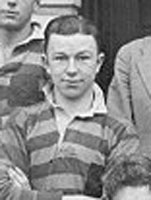On the night of 6th / 7th December 1942 this 102 Squadron aircraft took off from Pocklington airfield at 17.00hrs to undertake an operational flight to bomb Mannheim. The crew believed that they released their bombs over the target area from 8,000 feet through thick cloud, bombing on a large concentration of fire. During the course of being over Germany the aircraft's IFF aerial was shot away by flak. The aircraft appears to have escaped further damage and a safe return to Pocklington was made, landing at 00.57hrs.
Pilot - Sgt Brian John Ketchell RAFVR (1155502).
Navigator - Sgt Gordon Carruthers Haig RCAF (R/93443).
Wireless Operator / Air Gunner - Sgt William Charles Parry RAFVR (1067071).
Air Gunner - Sgt William Neville Hopwood RAFVR (1095270).
Air Gunner - Sgt Frederick Ernest Arthur Box RAFVR (1311922).
Flight Engineer - Sgt Cyril George Adnams RAFVR (922704).
Bomb Aimer - Sgt Clarence Ames Massey RCAF (R/82826).
Halifax W7918 was built to contract B.73328/40 by Handley Page Ltd. at Radlett. It was taken on charge as new by 102 Squadron at Pocklington on 6th November 1942 and was first used by them operationally on 28th November 1942. As a result of the damage sustained on 7th December 1942 Cat.A/FB damage was the assessment and a repair on site followed. It was slightly damaged again by flak on 20th December 1942, Cat.A/FB damage was again the damage assessment and it was repaired on site. On the night of 27th / 28th January 1943 it was lost on Ops to Dusseldorf that saw three of the then crew killed while the rest became PoW. Cat.E(m) damage was recorded on the aircraft's paperwork and it was struck off charge.
The whole crew listed above were killed on 8th / 9th December 1942 on a mine laying flight in Halifax W7925, the aircraft crashed into the sea and only two bodies were ever found.

Brian "Tim" Ketchell attended Lewes County Grammar School, Sussex between 1930 and 1938 rising to become Prefect and also School Captain. Known as "Tim" he was clearly a very clever young man. His school magazine (now available on the school website displaying back-issues and photographs) wrote about him failing to retun from Turin and spoke of him very favourably, the magazine stated that "at the time of going to press, there is no news of Tim Ketchell, who has been missing for some weeks after a raid on Turin. To write about Ketchell is to write about the School during the first eight years of its existence." "He came to us in 1930 as a Junior Scholar. Before he left he had captained the School, won his Rugger Colours, passed his School and Higher School Certificate and sealed his academic record by success in the highly competitive examination for Executive Officers in the Civil Service. He had also won the Povey Trophy the highest award the School has to offer. After leaving school he was a valued forward in the Lewes Rugby Club and he also played for his R.A.F. Wing at rugger - a sufficient testimony to his football abilities. His influence in the School was undoubtedly great. A sound fellow with level-headed and mature views for one so young he could not fail to exercise a great influence for good. Perhaps those who knew him best will remember most vividly his activities in the VIth Form Society, where his sturdy expression of opinion soon brought to earth the purveyor of impracticable fancies and hot air. Those who taught him will also think of his tremendous industry especially when working for the civil service examination. He knew that his object could only be achieved by a supreme effort. He was determined to succeed and succeed he did. When once he had completed his operational training, he very quickly became Captain of a Halifax bomber. His qualities were such that he could not have failed, with reasonable luck, to have gone far in the R.A.F. His last visit to School, only a few weeks before he was reported missing, has left memories of a modest, but very capable and determined pilot whose like the School is proud to claim as alumni. We shall still hope that he may be safe." Sgt Ketchell was twenty three years old, his body was never found and he is commemorated on the Runnymede Memorial.